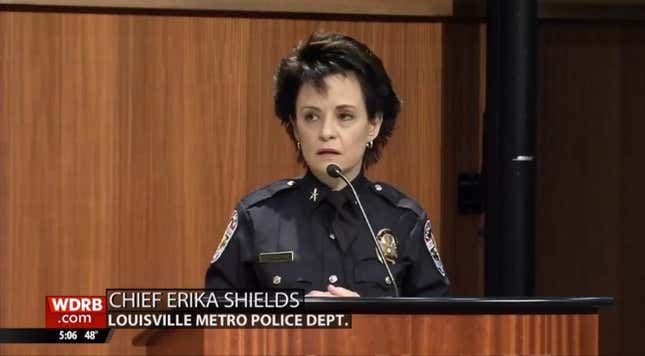
What happens when a high-ranking police officer resigns from one police department after the unjust police shooting of a Black citizen only to become police chief of another embattled police department that came into the spotlight after the unjust police shooting of another Black citizen? Well, mainly, the new police chief is being greeted with a lot of understandable skepticism and even scorn from activists who view the new appointment as a slap in the face to advocates for police reform.
Such is the case for 25-year police veteran Erika Shields. Shields resigned from the Atlanta Police Department last June after a police officer fatally shot Rayshard Brooks. She joined the force as a patrol officer in 1995 and had risen through the ranks “eventually commanding APD’s public standards unit and developing the department’s policies,” WHAS 11 reports. According to NBC News, Atlanta Mayor Keisha Lance Bottoms said Shields wanted to step down “so that the city may move forward with urgency in rebuilding the trust desperately needed in our communities.”
On Tuesday, Shields was sworn in by Louisville, Ky., Mayor Greg Fischer as the city’s new police chief—for the same police department that has drawn national attention for the shooting of Breonna Taylor.
“It’s mind-blowing that out of everyone, you decide to get the person who quit because of an officer-involved shooting with a young Black man and you bring them to Breonna Taylor’s Louisville,” Timothy Findley Jr., founder of the Justice and Freedom Coalition, said of Shields’ appointment, NBC reports.
Writer and activist Hannah Drake, who had been active in protests on behalf of Taylor, called Shields ’ appointment a “slap in the face” to everyone who has been fighting to bring justice in Taylor’s case. Drake also asked, “If she has such marvelous ideas, why didn’t she implement them in Atlanta?”
WDRB reports that after being sworn in, Shields answered reporters’ questions about Brooks’ shooting as well as that of Taylor, but she didn’t go into any specifics as to what reforms she plans to implement in Louisville as the new police chief. She acknowledged the public backlash she’s received since her new appointment was announced earlier this month and thanked Fischer for “having the confidence in my ability to get this job done.”
“I am here to fight for you. I am here to listen to you,” she said. “And I am here to help us bring forward the transformation that you all want to see within LMPD so that the department is a model that we can all stand proud of.”
While many people in the Louisville community are frustrated with Shields’ appointment—because to an activist, it really does just look like more of the same—some have expressed a willingness to put their skepticism aside and work with the new chief.
From NBC:
Sadiqa Reynolds, president and CEO of the Louisville Urban League, said the community has lost trust in the mayor’s office and the police department, but she said she is willing to work with Shields.
“We are really suffering in Louisville, and we are in a place where we’ve got to make sure that people are doing and saying the same thing. We really need transparency,” Reynolds said. “We want tomorrow to be a million times better than today, and I don’t think anyone wishes her failure, but there is certainly great apprehension.”
Community activist Christopher 2X—who had been vocal in his opposition to Shields’ appointment—said, “At this point, we need to adjust and try to co-exist in a good way and see if we can get some positive outcomes as far as community and police relations.”
Others argue that Shields’ success in her new position depends on her willingness to work closely with the community she’s charged with policing.
“I hope the new chief will not stop engaging with us when things get uncomfortable, because, quite frankly, Black folks have been uncomfortable in this country our entire existence,” Rep. Attica Scott, the legislator behind “Breonna’s Law” banning no-knock warrants, said. “If she’s not willing to move through that discomfort, we’ll never have healing, and we’ll never have reconciliation.”

